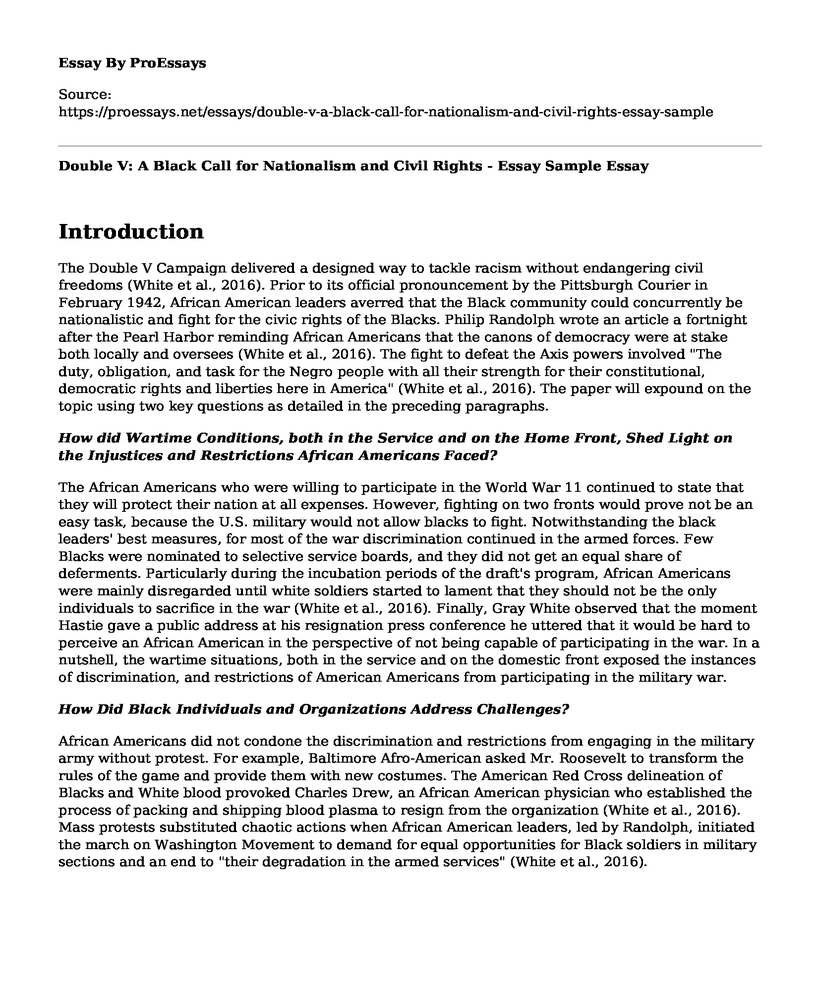Introduction
The Double V Campaign delivered a designed way to tackle racism without endangering civil freedoms (White et al., 2016). Prior to its official pronouncement by the Pittsburgh Courier in February 1942, African American leaders averred that the Black community could concurrently be nationalistic and fight for the civic rights of the Blacks. Philip Randolph wrote an article a fortnight after the Pearl Harbor reminding African Americans that the canons of democracy were at stake both locally and oversees (White et al., 2016). The fight to defeat the Axis powers involved "The duty, obligation, and task for the Negro people with all their strength for their constitutional, democratic rights and liberties here in America" (White et al., 2016). The paper will expound on the topic using two key questions as detailed in the preceding paragraphs.
How did Wartime Conditions, both in the Service and on the Home Front, Shed Light on the Injustices and Restrictions African Americans Faced?
The African Americans who were willing to participate in the World War 11 continued to state that they will protect their nation at all expenses. However, fighting on two fronts would prove not be an easy task, because the U.S. military would not allow blacks to fight. Notwithstanding the black leaders' best measures, for most of the war discrimination continued in the armed forces. Few Blacks were nominated to selective service boards, and they did not get an equal share of deferments. Particularly during the incubation periods of the draft's program, African Americans were mainly disregarded until white soldiers started to lament that they should not be the only individuals to sacrifice in the war (White et al., 2016). Finally, Gray White observed that the moment Hastie gave a public address at his resignation press conference he uttered that it would be hard to perceive an African American in the perspective of not being capable of participating in the war. In a nutshell, the wartime situations, both in the service and on the domestic front exposed the instances of discrimination, and restrictions of American Americans from participating in the military war.
How Did Black Individuals and Organizations Address Challenges?
African Americans did not condone the discrimination and restrictions from engaging in the military army without protest. For example, Baltimore Afro-American asked Mr. Roosevelt to transform the rules of the game and provide them with new costumes. The American Red Cross delineation of Blacks and White blood provoked Charles Drew, an African American physician who established the process of packing and shipping blood plasma to resign from the organization (White et al., 2016). Mass protests substituted chaotic actions when African American leaders, led by Randolph, initiated the march on Washington Movement to demand for equal opportunities for Black soldiers in military sections and an end to "their degradation in the armed services" (White et al., 2016).
Conclusion
In conclusion, based on the analysis of the two questions; it is evident that African Americans were being discriminated and restricted from participating in the military service both locally and on international fronts during the early years of the draft's programs. These actions instigated the establishment of the Washington Movement to provide an ultimatum on equal opportunities for Black soldiers in the armed services and strongly advocated for an end in the disgrace of those who had been selected.
References
White, D. G., Bay, M., & Martin Jr, W. E. (2016). Freedom on my mind: A history of African Americans, with documents. Macmillan Higher Education.
Cite this page
Double V: A Black Call for Nationalism and Civil Rights - Essay Sample. (2023, Jun 21). Retrieved from https://proessays.net/essays/double-v-a-black-call-for-nationalism-and-civil-rights-essay-sample
If you are the original author of this essay and no longer wish to have it published on the ProEssays website, please click below to request its removal:
- Cellphone Usage and Attention While Driving Essay
- Influence of Race and Racism on Canadian History - Essay Sample
- Memory, Bias and Heuristics, Human Development Paper Example
- Benefits of Decriminalizing Illicit Substances in Canada - Essay Sample
- Essay Example on Child Neglect: Denial of Basic Needs, Severe Consequences
- U.S. Marijuana Use: Federal vs. State Laws - Research Paper
- Sexual Harassment in the Military - Free Report Example







